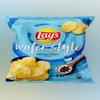PepsiCo India has initiated trials to replace palm oil and palmolein with a combination of sunflower oil and palmolein in Lay's chips, according to a report in The Economic Times (ET).
This decision follows criticism over using cheaper ingredients, considered unhealthy, in packaged foods in India. Palmolein is a liquid segment acquired through refining palm oil, both of which are sourced from the oil palm fruit. Palm oil is semi-solid.
In the United States, leading snacks and beverages manufacturer PepsiCo uses "heart-healthy" oils such as sunflower, corn, and canola oil for Lay's. On its US website, the company states, "Our chips are cooked in oils that may be considered heart-healthy."
It further notes, "Sunflower, corn, and canola oils contain good mono- and polyunsaturated fats, which can help lower LDL (bad) cholesterol and maintain HDL (good) cholesterol as part of a calorie-controlled diet."
Check on salt content
The report cited a PepsiCo India spokesperson as saying that trials with this blend in certain products position the company as "one of the few players in the food industry in India to do so." The Indian division is also working to reduce the salt content in its snacks to below 1.3 mg of sodium per calorie by 2025.
Numerous packaged food brands in India, ranging from salty snacks and biscuits to chocolates, bread, and ice cream, use palm oil because it costs less than sunflower or soybean oil. The cost of Lay's classic salted chips in India starts at Rs 10, making it one of the brand's cheapest products.
Cheaper ingredients in packaged foods
Packaged food companies, particularly multinational corporations, have been criticised for using cheaper or less nutritious ingredients in developing nations than in the US and Europe.
More From This Section
Recently, Nestle India announced plans to develop a no-added-sugar version of its infant food Cerelac after facing controversy over higher levels of added sugar in Asia and Africa. This followed a report by Swiss investigative organisation Public Eye and the International Baby Food Action Network, indicating that Cerelac contained nearly 3 grams of sugar per serving in India.
The report said sugar had been included in Nestle's infant foods in low- and middle-income countries such as India but not in developed markets like the United Kingdom, Germany, Switzerland, and other European countries.
Difference between palm oil and palmolein
Palm oil and palmolein are both derived from the fruit of the oil palm tree, but they are different products with distinct characteristics. Palm oil is extracted from the flesh of the palm fruit. It is semi-solid at room temperature due to its high saturation of saturated fats. Palmolein, on the other hand, is a type of palm oil that has been further processed to yield a liquid form. It is obtained by fractionating palm oil to separate the liquid (olein) from the solid (stearin) components. It remains liquid at room temperature.

)
